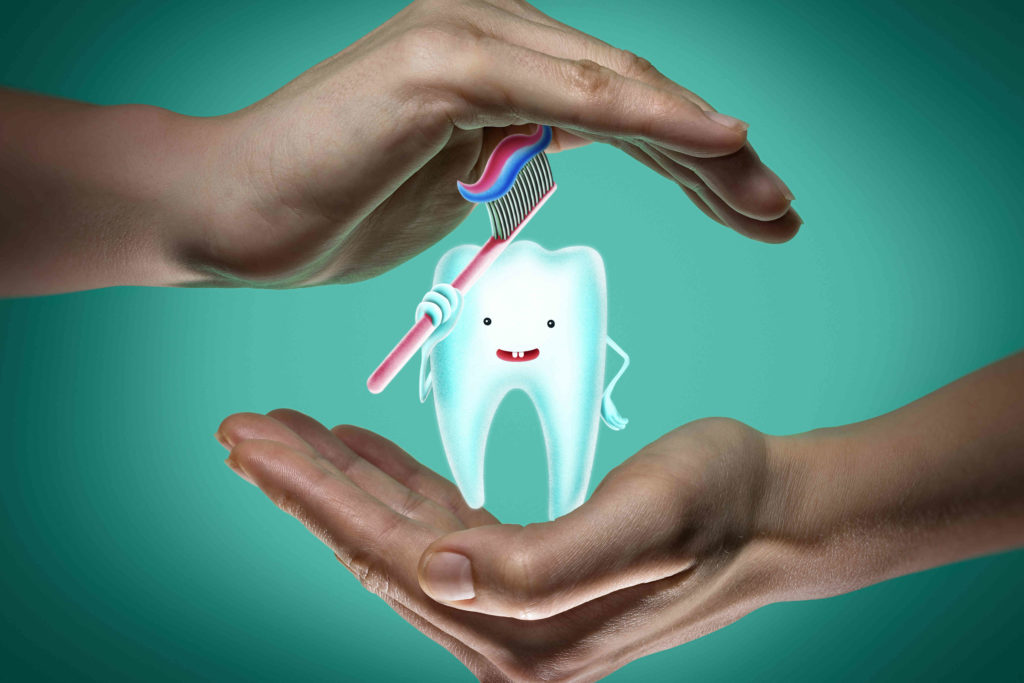In 2018, the Swiss Society of Dentists SSO has published the results of a survey on oral prophylaxis. It reveals that around 2 out of 3 people who consult a dentist in Switzerland do so as a preventive measure. In fact, check-ups are the only way to verify the condition of teeth, gums and the mouth in general. Discover the pillars of oral health prophylaxis.
Prevention is better than cure
This popular saying takes on its full meaning when it comes to oral hygiene. The mouth is the entry point for many bacteria that can cause disease. Prevention or prophylaxis encompasses all the measures to be taken to prevent the onset, recurrence and spread of disease.
Prophylaxis is at the heart of public health campaigns, such as the one recently run by the Swiss Red Cross CRS. In this video clip, the aim is to raise awareness of the importance of oral health through simple, universal prevention messages.
Oral prophylaxis is based on 4 major pillars:
- good oral hygiene
- a healthy, balanced diet
- fluoride intake
- no smoking
By following the steps outlined below, you can greatly reduce the risk of suffering from a dental emergency in Lausanne or elsewhere in Switzerland.
Good dental and gum hygiene habits
- Brush your teeth at least 2 times a day, ideally after each meal, for 2 minutes each time.
- Use interdental cleaning aids such as wire or brushes.
- See a dentist regularly for check-ups and scaling (at least once a year for adults, twice a year for children).
- Regular professional care for thedental hygienist or the prophylaxis assistant.
Nutrition and oral prophylaxis
In the past, diseases linked to nutritional deficiencies were the main cause of poor tooth health and even tooth loss. These included scurvy (vitamin C deficiency), rickets (calcium and vitamin D deficiency) and anemia (iron deficiency).
Today, theWorld Health Organization (WHO) reveals that an imbalance in diet is at the root of the most widespread disease. This is tooth decay, caused by excessive consumption of sugar, the main enemy of teeth.
We recommend that you change some of your eating habits, such as :
- Choose water and limit sugary drinks (soft drinks, fruit juices, etc.) as much as possible.
- Avoid snacking. If you feel hungry between meals, munch on fruit, nuts or vegetables instead of sugary industrial snacks.
- Give preference to sweets bearing the protected Swiss "Sympadent" label. The logo, featuring a gentleman under an umbrella, distinguishes gourmet products that are gentle on your teeth (candy, chewing gum, chocolate). It guarantees that they are neither cariogenic nor erosive. The Swiss Federal Office of Public Health recognizes the "sugar-free" and "tooth-friendly" labels.
Necessary fluoride intake
Do you know what fluorides are? Fluoride salts occur naturally in the environment. In terms of oral health, they are extremely useful in preventing tooth decay. In fact, fluorides make enamel more resistant to acid attack, while promoting remineralization.
That said, it's hard to find the required amount of fluoride in food or drinking water. The good news? Many dental hygiene products contain fluoride. We recommend that you choose a fluoridated toothpaste, and possibly a fluoride-enriched gel, lozenge and/or mouthwash.
A complementary solution is to include fluoridated cooking salt in your diet. Fluoride intake is particularly important for children. Use a suitable fluoride toothpaste as soon as the first baby tooth erupts.
Smoking damages the health of your teeth
It's no secret. Numerous studies have demonstrated the harmful effects of smoking on health in general, and oral health in particular. In addition to the increased risk of developing certain types of cancer, smokers expose themselves to other pathologies. The mucous membranes, gums, tissues and bones that support the teeth are weakened. Cavities, yellow stains, periodontal disease and tooth loosening are just some of the possible consequences of tobacco consumption. It also alters the taste buds.
You now know the basic principles of oral prophylaxis. Don't hesitate to contact your dentist or dental hygienist for personalized advice. The entire care team HELVIDENT welcomes you to its dental clinics in Fribourg, Lausanne and Aigle.

